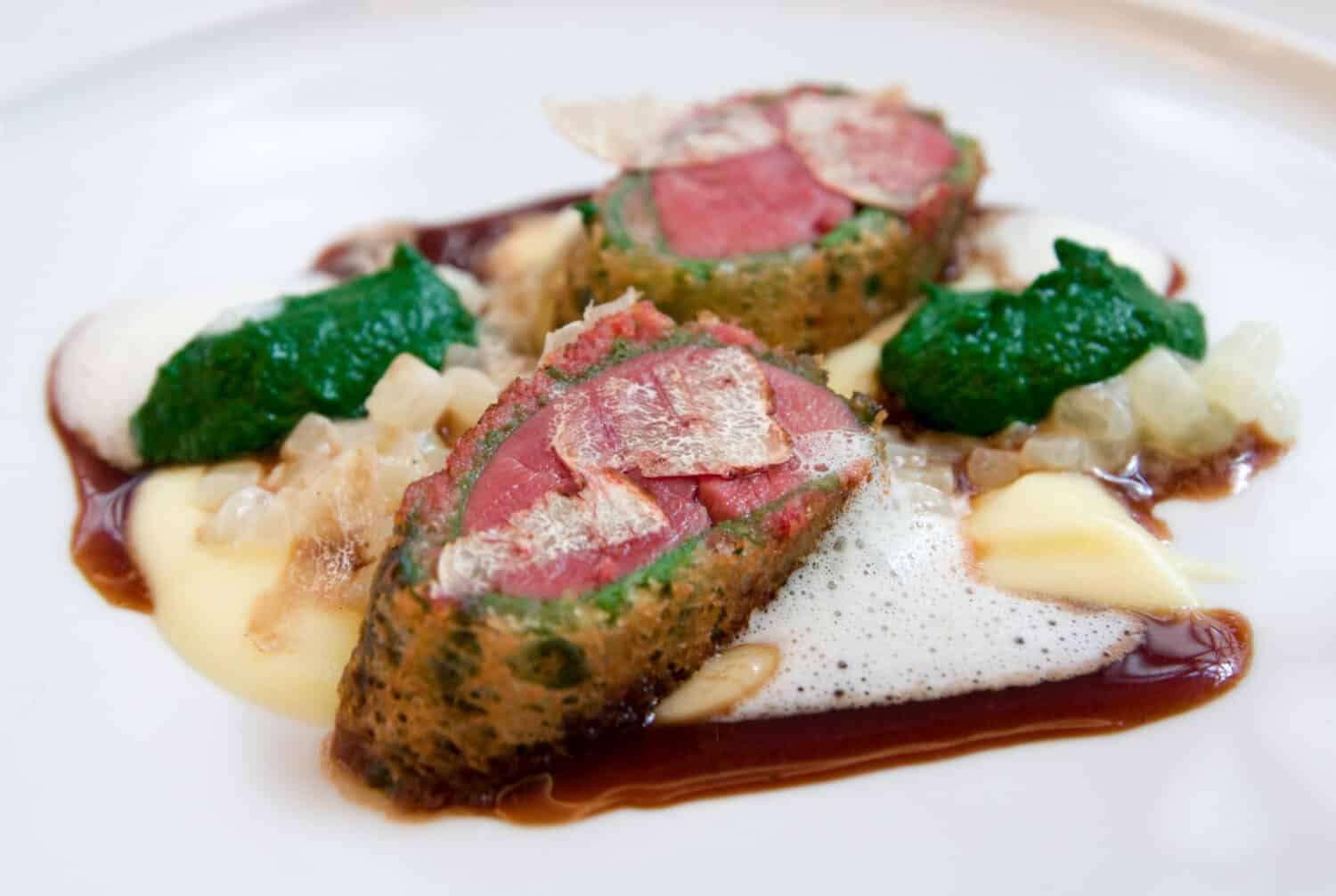While pigeon meat isn’t as popular as it once was, North Americans loved squab so much that they ate the passenger pigeon into extinction by the early twentieth century. However, squab consumption is once again on the rise, and it never went out of style in other countries outside of the United States. We’re going to discuss pigeon meat and the 7 things you should know about squab now.
1. Squab Meat is a Dark Meat
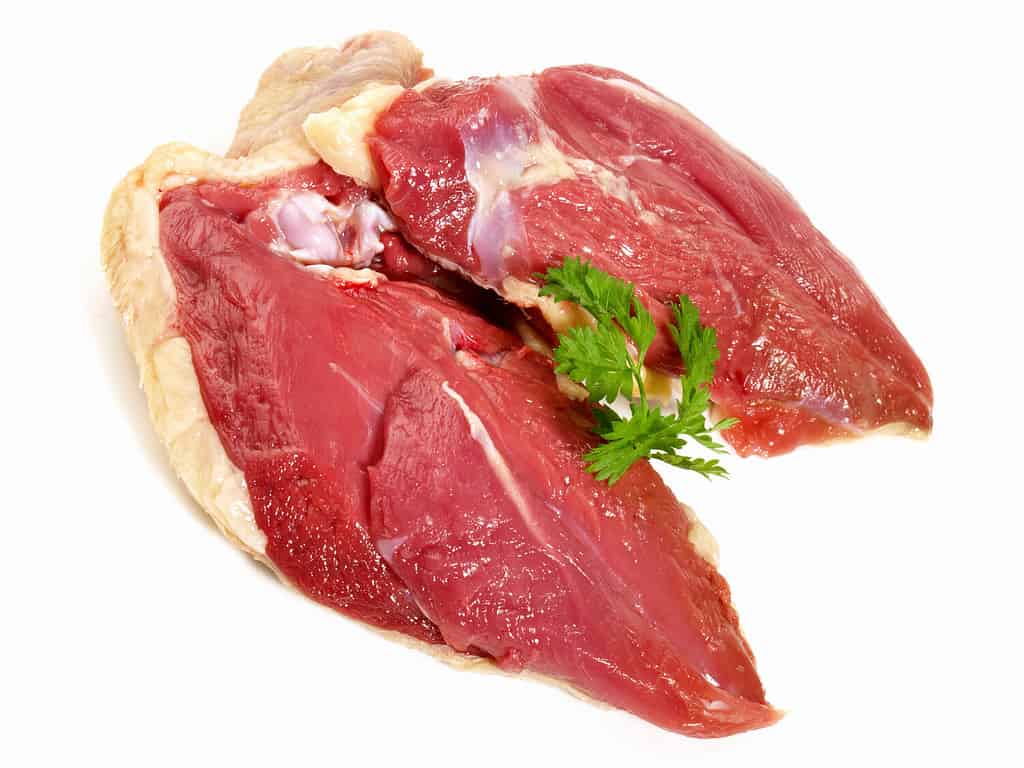
Squab is a dark meat that tastes like a cross between a duck and dark chicken meat.
©Food Impressions/Shutterstock.com
People who have tried squab say it’s like dark chicken meat crossed with duck. This deep meat flavor sometimes has an egg yolk or berry accent to it as well. While it comes off as slightly gamey, it is milder than other game birds.
2. There Is More Protein and Less Fat in Pigeon Meat
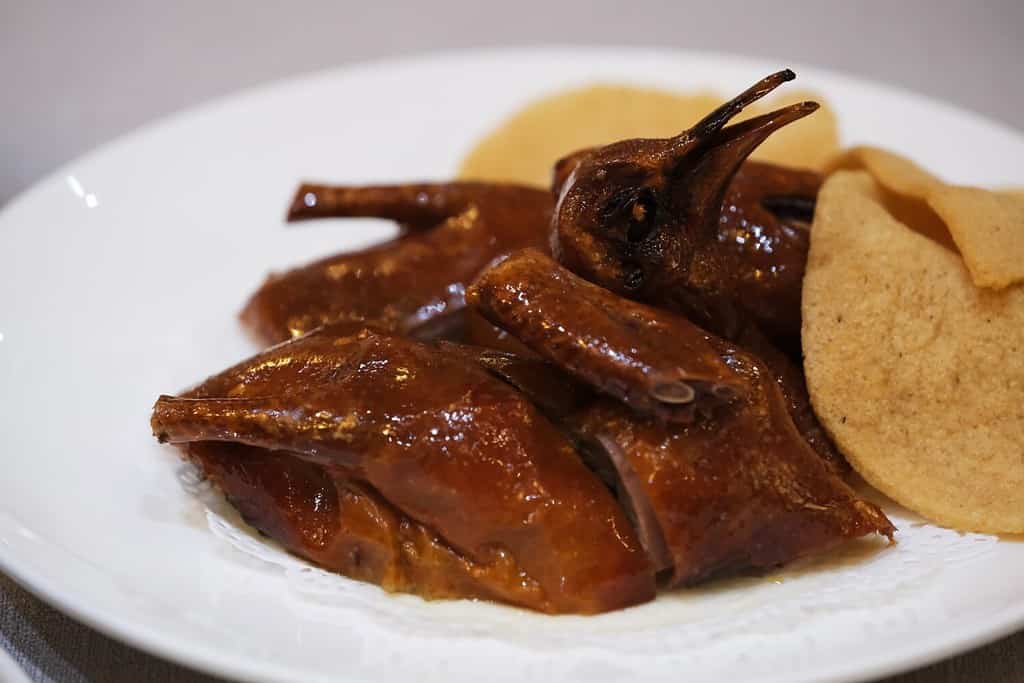
Squab meat is high in protein, low in fat, and low in cholesterol.
©Robert Way/Shutterstock.com
Compared to other poultry, there is less fat and more protein in squab meat. This makes pigeon meat valued in many cultures as it’s still rich in taste while being very lean.
It’s also a great choice because it’s low in cholesterol. Squab is experiencing a resurgence in popularity because of its nutritive qualities in comparison to other meat sources.
3. Pigeon Meat for Sale Is Not From Street Pigeons

The pigeons used for food are not the feral urban pigeons often seen in cities.
©MNStudio/Shutterstock.com
The farm-raised pigeons used as squab meat are not the same as the pigeons that live on urban streets. Urban pigeons are feral domestic pigeons that have again become wild, and they feed on the scraps that humans leave around cities. Squabs are young farm-raised pigeons that eat controlled diets of quality foods.
Pigeons are technically omnivores, though most of their diet is vegetative. They enjoy herbs, fruits, berries, seeds, and grains. Each squab farmer has a feed mix they use, and often natural foods are supplemented by pellets containing essential vitamins and minerals.
Feral pigeons found on the street should not be eaten. While they don’t usually carry harrowing diseases as rumored, they are usually covered with mites and ticks. Ticks and mites do carry diseases that may be very harmful to your health.
4. Squab Is Sourced From Young Pigeons
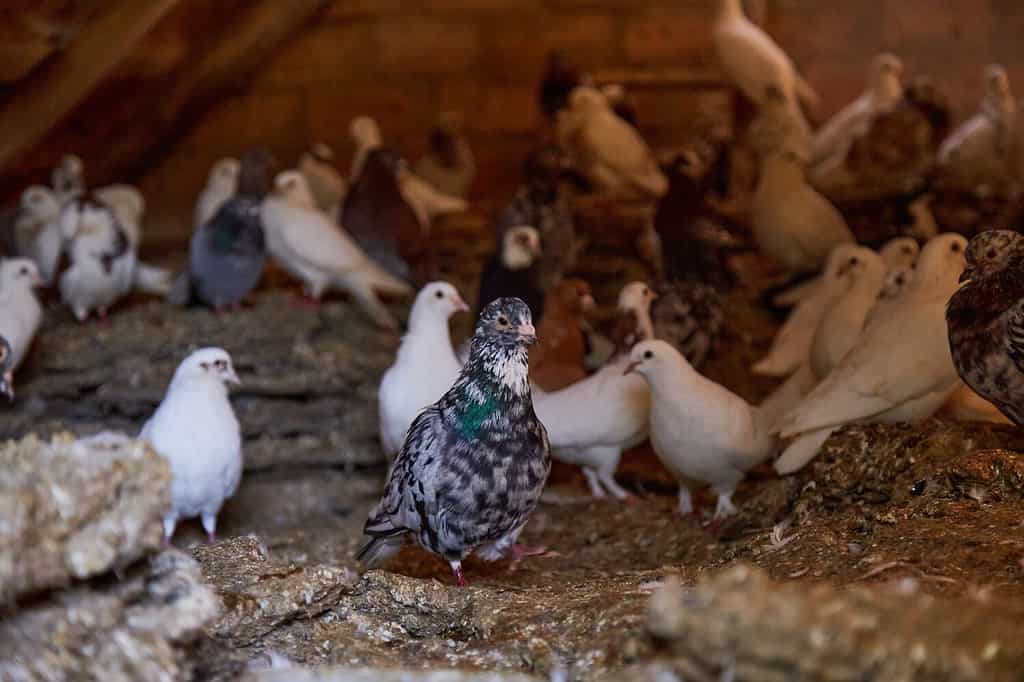
Food pigeons are young, but they aren’t babies.
©Alkema Natalia/Shutterstock.com
Pigeons used for squab are harvested at around 4 weeks of age. This is because an older pigeon has less fat combined with tougher meat which makes it harder to eat. The adage is if a pigeon can fly, it’s too old for eating.
Eating a pigeon that is 4 weeks old is not the same as eating a baby bird. By the time a pigeon is ready for butchering, they are almost the size of an adult. They also have feathers, though the flight feathers are not yet developed.
5. Eating Medium Rare Squab Is Mostly Safe
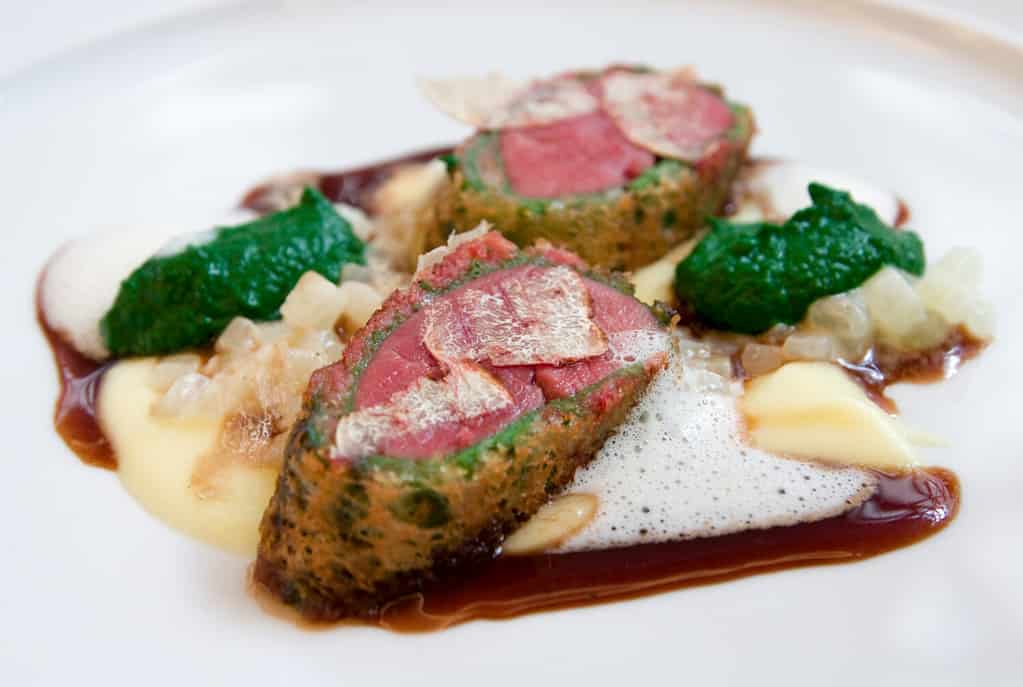
Pigeon is usually served medium rare for the best flavor.
©Kondor83/Shutterstock.com
Squab is often served medium rare or medium well which is contrary to most other bird meats. If pigeon meat is cooked beyond medium well, it often takes on a livery flavor.
It’s safe to eat medium rare squab because it doesn’t carry as high of a risk of pathogen contamination. That’s because the farming practices necessary to raise squab aren’t as conducive to infection. Because chicken and other commercially produced poultry are kept in severely confined quarters, salmonella and other pathogens are much more likely to wind up on your plate.
When overcooked, pigeon meat becomes tough. Also, it’s easy to overcook squab. It only takes 10 to 20 minutes to roast one of these birds whereas a chicken usually takes an hour or more.
People think that all of the redness needs to be cooked out of a bird’s meat, though this isn’t the case with pigeons. If squab is cooked until it is grey, it’s overdone.
6. Pigeon Is a Sustainable Meat Choice
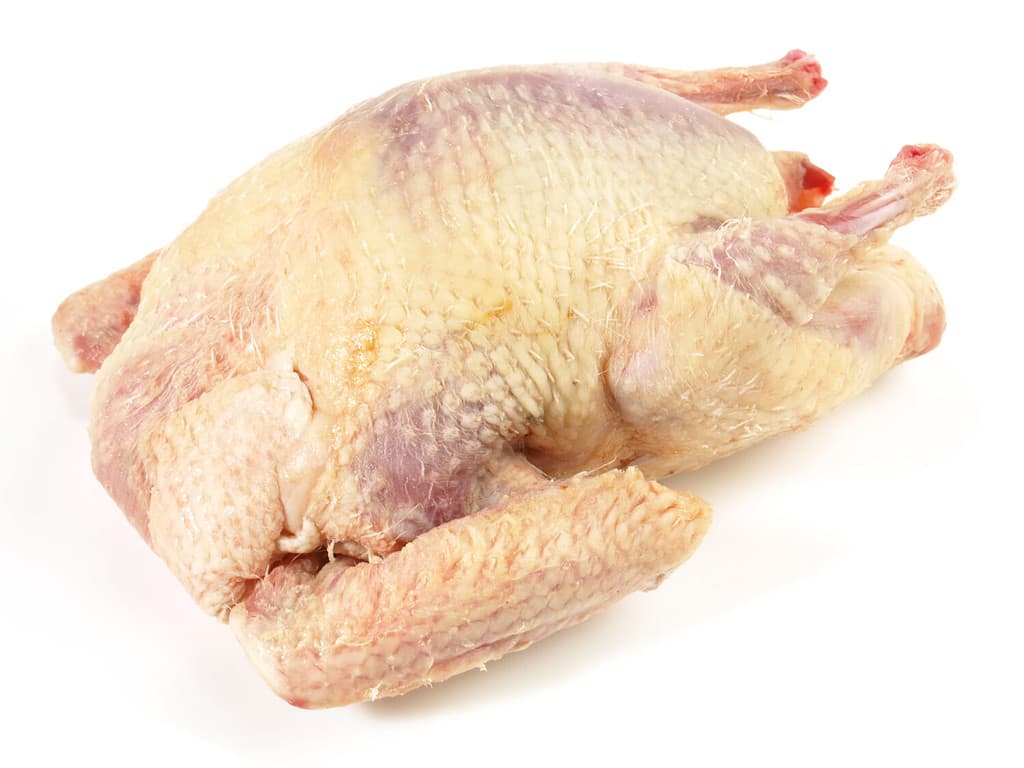
Pigeons are one of the most sustainable meat choices on the market.
©Food Impressions/Shutterstock.com
Not much land is required to raise pigeons. As a result, they are a great choice for family farms or small-scale productions. Pigeons also eat less food per pound of usable meat than any other food bird.
Because pigeons don’t require much space or resources to grow, the carbon footprint of squab consumption is very low. For example, one pound of beef is 1000 percent more detrimental to the environment than a pound of squab. This is because the food, housing, water, and electricity commitment required for squab consumption is much lower than with beef.
Pigeons only require about 2 square feet per bird, and a run space isn’t necessary though room to flutter around is preferred. It’s also possible to train pigeons to leave the roost and fly in the wild, which eliminates the need for free enclosed space. In comparison, chickens need about 4 square feet per bird and at least 8 feet of run space per bird.
Despite pigeon meat being sustainable, it is often overlooked. One of the reasons for this is it takes longer to produce a sellable commodity.
That’s because a pair of pigeons only averages 2 offspring every month and a half. In contrast, chickens can create 30 birds in a month.
Also, pigeons cannot be artificially inseminated and they breed in committed pairs. This demands a more intense level of animal husbandry not required by other food birds.
7. Squab is a Kosher Meat
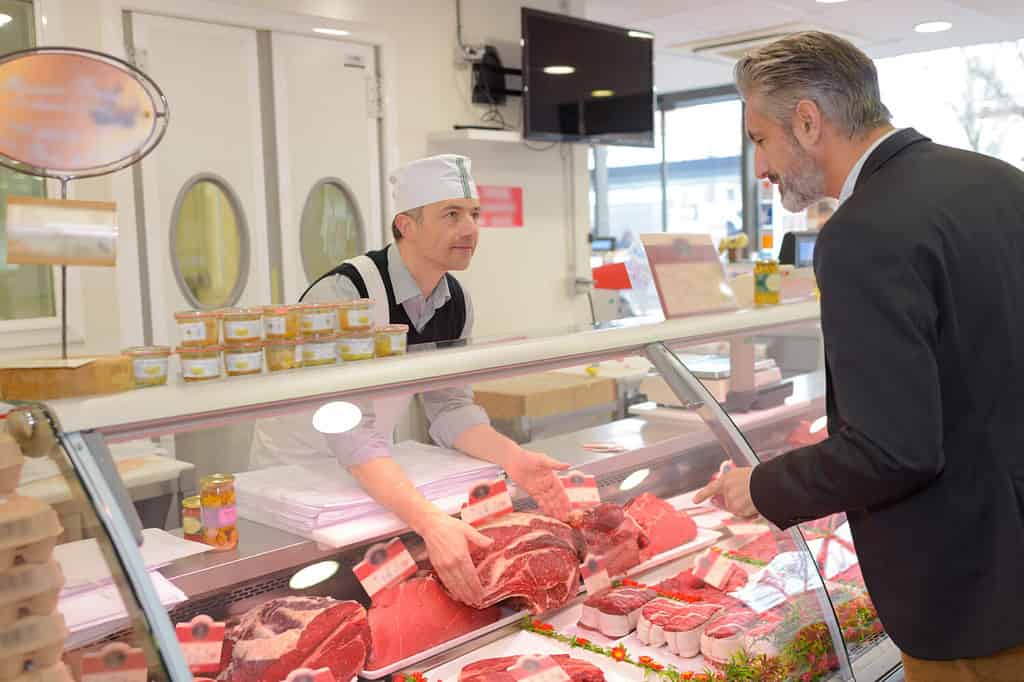
Squab is only kosher if it’s butchered properly and salted.
©ALPA PROD/Shutterstock.com
Depending on how squab is butchered and processed, it can be kosher. Leviticus 1:14 states, “If your offering is a burnt offering of birds, you shall choose your offering from turtledoves or pigeons.” While this doesn’t specifically denote the squab as an acceptable food item, squab is also not mentioned as a forbidden food in the Torah.
In most Jewish communities today, squab is considered a kosher bird along with duck, chicken, and turkey. Since the kosher status of birds can be dubious due to a lack of direction in the Torah, Jews often rely on generational family traditions to decide if a bird is consumable. Pigeons are one of those birds with a verifiable food history in the Jewish community.
A squab is not kosher if it hasn’t undergone shehitah and salting. Shehitah is a slaughtering method that is valued as fast and humane, and it involves incising the neck just right so that the animal is immediately rendered unconscious while bleeding out with only one motion. Salting further removes blood from the animal as blood is not a kosher food.
| Pigeon Meat: Things You Should Know About Squab | |
|---|---|
| 1 | Squab meat is dark meat |
| 2 | There is more protein and less fat in pigeon meat |
| 3 | Pigeon meat for sale is not from street pigeons |
| 4 | Squab is sourced from young pigeons |
| 5 | Eating medium-rare squab is mostly safe |
| 6 | Pigeon is a sustainable meat choice |
| 7 | Squab is a kosher meat |
Thank you for reading! Have some feedback for us? Contact the AZ Animals editorial team.

